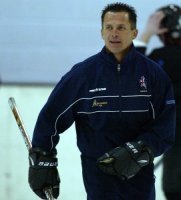- Home
- News
- Features
- Team
- Fixtures
- League Table
- Phoenix TV
- Podcast
- 200 Club
- Beginners Guide to Ice Hockey
- Supporter Sponsorship
- Phoenix Photography
- Contact
- About
Features
Rick Brebant interview
Before the Q&A session following the second set of player trials, Manchester Phoenix Head Coach Rick Brebant held a short interview with FOMIH Fan Liaison, Richard Allan.
Richard Allan: We’ve just the second trials of home grown talent, what do you think of what you’ve seen out on the ice?
Rick Brebant: Oh definitely there’s a lot of room for improvement, they’re going to be playing against men a little bit stronger and a little bit faster, but the energy that they showed today and the skating levels are very impressive and there’s a lot of kids out there that with a little bit of work and commitment from themselves that will be able to play in the Elite League.
RA: How important to the British game do you think it is to have British players out on the ice?
RB: It’s important in any game, whether it be in Britain or in Sweden or anywhere, if you don’t have players coming up through your ranks who can play at the top level then sooner or later they’re going to be disheartened and they’re going to walk away from the game late in their teens. We need to create a hierarchy where they have an opportunity through good junior development to play for these clubs. The Superleague may have got it wrong, and I think it hurt junior development in this country as a whole, and I think that the Elite League have it in the right place and it’s up to the coaches of these Elite teams to put their time and commitment into these young British players and help them develop, and not just play two line hockey because then we’d just be playing Superleague hockey with two lines. Our intentions, and my intentions here, are to get these kids playing time. Maybe early on they won’t get as much until they adapt to the systems because everything’s new to them, but I plan on using them regularly as a part of the three lines, three and a half lines, whatever we have in our club. I’m not going to play my imports all the time, over a fifty game season it takes its toll. When they come here, they’re going to be a part of this club both on and off the ice.
RA: You’ve had coaching experience in the past, you’ve been a player-coach at Newcastle and a player-assistant coach at Sheffield. This time round with the Manchester Phoenix you’re just the Head Coach – no more playing. How do you think that changes your approach?
RB: Well I think in my time at Newcastle I had too many hats, being coach, manager and playing also, and it became a situation where I just fighting fires in the various camps. My time at Sheffield went well, Mike Blaisdell and I had great success. I’m still happy that I’m involved in the game, I love this sport and I’m really enthusiastic about the upcoming season. We have a great fan base, you know, and in the great years you couldn’t get better. It’s unfortunate what’s happened in the past, but we need everyone to come together, the fans of old and fans of news, and build a big family. The players need to feel that they’re a part of this family, and the players need to make the fans feel like they’re part of the family. t’s like an ownership, you know, everyone feels important and responsible to the club, and our hope is to do that.
RA: The fans of Manchester have always been fiercely proud and very territorial, they cheered you when you were a player for us, they booed you when you were at London and they booed you at Sheffield. What are you going to do to try to get the fans to cheer you again this year?
RB: You know what, at the end of the day I can’t do anything. They’re entitled to it! I’m here to do a job, my job will try and bring success to this organisation and win hockey games, and people are still going to do what they do. The reasons why I left Manchester will always be my reasons and they were legitimate reasons, but that’s in the past. We’re now building a club from scratch, and if they want to boo me then they can boo me, but they should also be looking to help this club go to the next step.
RA: So we have a new team and a new league, do you think this bodes well for the future of the sport?
RB: Oh definitely, I think the owners have put a good package and gameplan together, and if everyone sticks to the wage cap and brings along development players then it’ll definitely help promote the game and promote junior development. But if along the way success outweighs development and these players are just sitting on the pine, then we’ve made no steps further.
RA: Rick Brebant, thank you very much.
RB: Thank you.
















